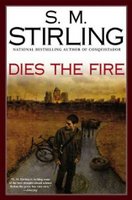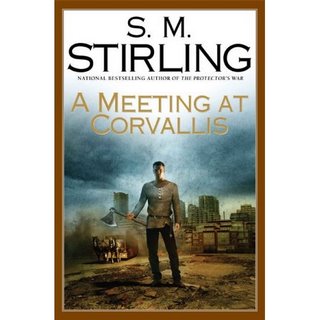
 A couple years ago, S M Stirling (one of my favourite authors) came out with a book called Dies the Fire, in which the Earth suffers a mysterious "Change" which renders electrical power, and gunpowder and other explosives, steam power, and compressed air ineffective. The book was set in the northwestern US, primarily in Oregon but with early scenes in Idaho; the two main characters were Mike Havel, former Marine and charter pilot, and Juniper Mackenzie, folk singer and Wiccan priestess, and most of the book dealt with their - and other people's - efforts at surviving the crisis and maintaining civilisation. (Amazing - unbelievable, even - luck is a major factor in anyone's survival under these circumstances.) Warnings of future problems came from the city of Portland, Oregon, where former history professor Norman Arminger was using gang members, SCA people and others to form the Portland Protective Association, ostensibly to save the city but actually to create Arminger's private little kingdom.
A couple years ago, S M Stirling (one of my favourite authors) came out with a book called Dies the Fire, in which the Earth suffers a mysterious "Change" which renders electrical power, and gunpowder and other explosives, steam power, and compressed air ineffective. The book was set in the northwestern US, primarily in Oregon but with early scenes in Idaho; the two main characters were Mike Havel, former Marine and charter pilot, and Juniper Mackenzie, folk singer and Wiccan priestess, and most of the book dealt with their - and other people's - efforts at surviving the crisis and maintaining civilisation. (Amazing - unbelievable, even - luck is a major factor in anyone's survival under these circumstances.) Warnings of future problems came from the city of Portland, Oregon, where former history professor Norman Arminger was using gang members, SCA people and others to form the Portland Protective Association, ostensibly to save the city but actually to create Arminger's private little kingdom.The story was continued in The Protector's War, published last year. Eight years after the Change, its cause is still unknown, but its effects haven't gone away. King Charles III rules what is left of England (which has been reinforced with refugees from Iceland, the Faeroes and elsewhere), though not everyone is happy with the way things are going. Colonel Sir Nigel Loring, late of the Household Cavalry, is one of these, and he and a couple others find it expedient to leave the country with all possible speed (which, of course, means a sailing ship). They fetch up in Oregon, of course, where Havel's "Bearkillers" and Clan Mackenzie are facing numerous border incidents with the PPA. (Some of which, it must be admitted, they themselves are responsible for....) A fourth player in the politics of post-Change Oregon is the city-state of Corvallis, which is based around the university there; they're doing their best to stay neutral, despite all indications that this is a bad idea. And the monastery at Mount Angel, while the least powerful entity in the Willamette valley, is not entirely to be ignored; they're firmly on the side of Havel and Mackenzie.
 The third book in the series, A Meeting at Corvallis, hit the shelves in bookstores this week. The border incidents have turned into full-scale war; Arminger's forces have invested Mount Angel, while other armies are striking at both the Mackenzies and the Bearkillers. The good guys are outnumbered, and the Faculty Senate at Corvallis are still refusing to dedigitate. And if you think it's a given that the good guys will win, just remember that this trilogy is written by the man who wrote the Draka series, in which the good guys most assuredly did not win....
The third book in the series, A Meeting at Corvallis, hit the shelves in bookstores this week. The border incidents have turned into full-scale war; Arminger's forces have invested Mount Angel, while other armies are striking at both the Mackenzies and the Bearkillers. The good guys are outnumbered, and the Faculty Senate at Corvallis are still refusing to dedigitate. And if you think it's a given that the good guys will win, just remember that this trilogy is written by the man who wrote the Draka series, in which the good guys most assuredly did not win....As usual, Stirling excels at fight scenes, be they individual combat or full-scale battles. And he has a great eye for detail, whether it be architectural, scenic or other. Some readers may balk at the above-mentioned amazing luck of Havel, Mackenzie and their followers, while some may find Juniper's whole-hearted belief in Wicca offensive* and others may object to the science involved. But if you can get past all these, you'll find a truly outstanding story.
For those who want to test-drive Corvallis before buying it, the first ten chapters are available on-line here. If you haven't read the first two books yet, the first eleven chapters of DtF are available here, and the first ten chapters of TPW are here.
 But that's not all. Stirling's next book, The Sky People, is coming out in early November. The book is set on Venus, but not the Venus we know; in this alternate world, unmanned landers launched in the 1960s showed that both Venus and Mars were teeming with life. Venus is the jungle world of '30s pulp fiction (think Brackett, Kline and ERB), while Mars is the dried-up desert world those authors wrote about. And both planets are occupied, not only by plants and animals, but by humans....
But that's not all. Stirling's next book, The Sky People, is coming out in early November. The book is set on Venus, but not the Venus we know; in this alternate world, unmanned landers launched in the 1960s showed that both Venus and Mars were teeming with life. Venus is the jungle world of '30s pulp fiction (think Brackett, Kline and ERB), while Mars is the dried-up desert world those authors wrote about. And both planets are occupied, not only by plants and animals, but by humans....Again, sample chapters are available - six of them, plus a prologue, here. And the story will be continued next year, on Mars, in a book titled In the Halls of the Crimson Kings.
* I must confess that I personally find it rather annoying, though I would react the same way to any highly religious character.











No comments:
Post a Comment